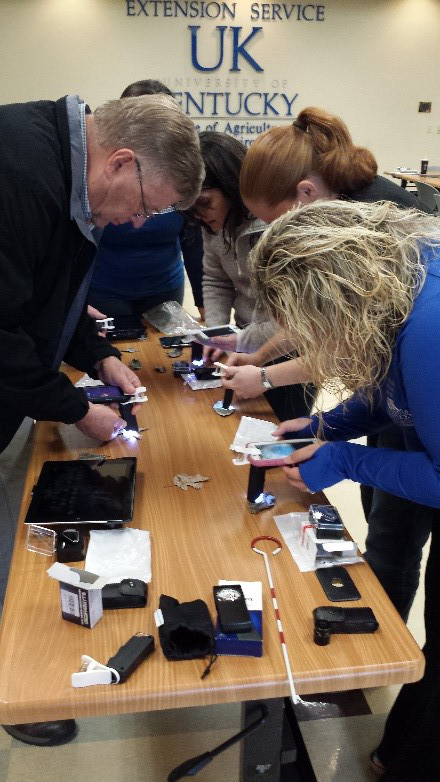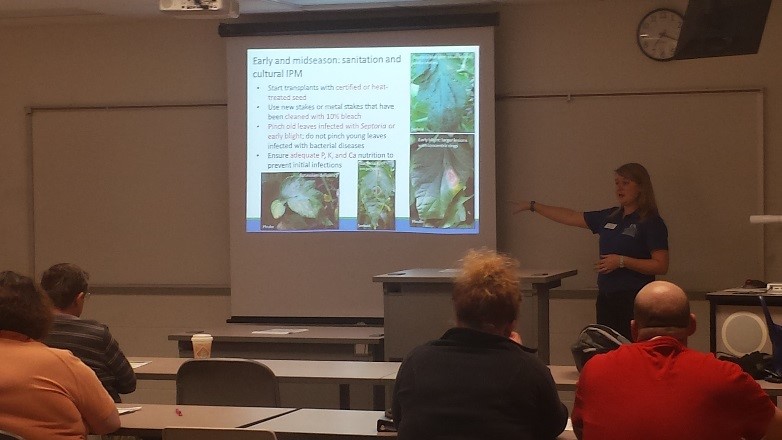 Time in that position: 8 months
Time in that position: 8 months
Distribution of efforts: 100% extension
Degree held, thesis/dissertation topic: BS in horticulture production and marketing and agriculture sales and marketing; MS in plant pathology with a focus on fungicide resistance in apple scab
Current commodity assignment: Residential fruit, ornamental, and vegetable pathology
Typical workload in spring:
Questions and inquiries from agents increases, as is social media maintenance. During spring months, there are numerous requests for Master Gardener classes. Providing this three-hour presentation/hands-on training requires the preparation of samples, state-wide travel, and long days/late nights.
Typical workload in summer:
In summer, the workload is moderate and slower paced. Activities include assisting agents with homeowner inquires and social media maintenance. These months are spent visiting sites to collect diseased plants and obtain video and photographs for future projects. I also organize and conduct agent trainings.
Typical workload in fall:
Fall is a slower pace due to the end of the growing season. Social media maintenance slows and work on publications begins. Some agent trainings and Master Gardener programs are conducted during the fall.
Typical workload in winter:
Winter months begin with a pace similar to fall, but late-winter months can be extremely busy. Numerous grower meetings are conducted during this time, which provide opportunities to collect grower testimonials and profiles. Publications and videos must be finalized during this time to be available for spring. Social media platforms are also maintained on a weekly basis.
 Most rewarding thing about working in Extension:
Most rewarding thing about working in Extension:
The most rewarding thing about working in Extension is being able to assist and educate agents and the general public. The work that I do is directly utilized and is in direct response to needs. Publications, videos, social media outreach, and training programs all act as ways to help educate our stakeholders about plant pathology and act as the beginning steps in solving disease problems. In addition, through collaboration with other Extension professionals, we are often able to provide holistic management options for plant problems.
Challenges with Extension work; what early career professionals need to know:
Perhaps the biggest challenge with Extension is funding. We continually are looking for funding sources and developing creative ways to stretch a dollar. While this fosters creativity and resourcefulness, it often means limited options for programing. Another area that could be a source of stress for some individuals is the collaborative nature of the Extension system. Many projects result in working with others in the department, as well as those in other departments. These team projects might result in stressful situations when deadlines are missed or projects don’t go as planned.
Put into context the way Extension is evaluated at your institution:
Extension at the University of Kentucky is evaluated based on impact. In our program we record impact through numerous surveys that evaluate change in understanding and anticipated implementation. Testimonials are also collected. All of this information is used to generate success stories, which are submitted on an annual basis.
Advice to graduate students and early career professionals who want to pursue a career in Extension:
Diversify and make an effort to learn about topics outside of your direct area. Get outside and spend time in production systems, learn about how growers do what they do. Learn to translate for laymen because the audience for Extension is often not the scientific community, so learn to communicate research and scientific concepts in a simple, easy to understand way that can be understood by the general public. Ask yourself why you do what you do and learn to determine the impact of your activities. Don’t forget to assess things from a wider angle. Find a mentor who can help guide you, who can help prepare you for challenges and provide you with a real world view of Extension.
